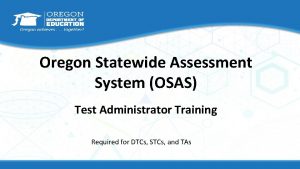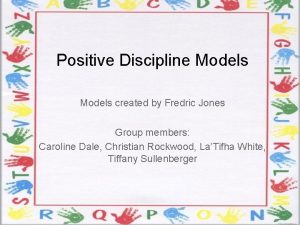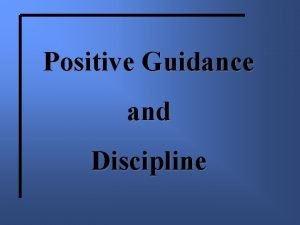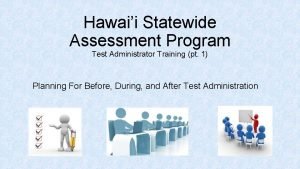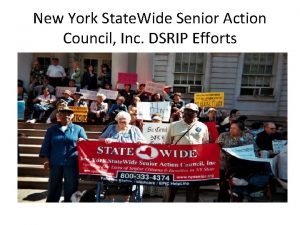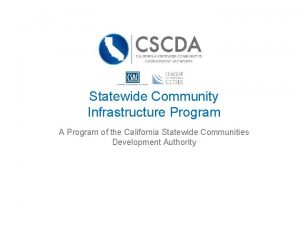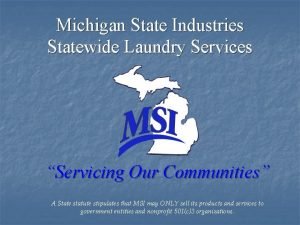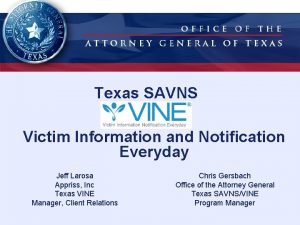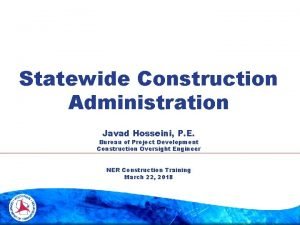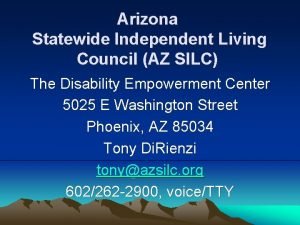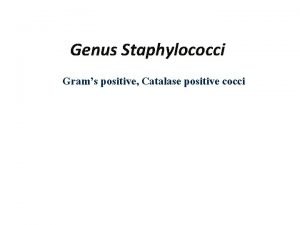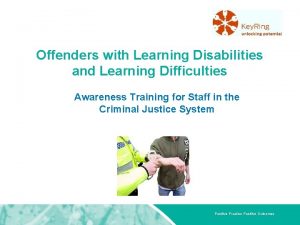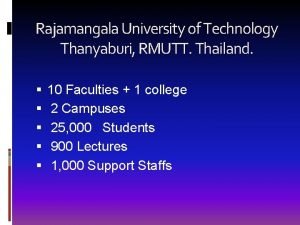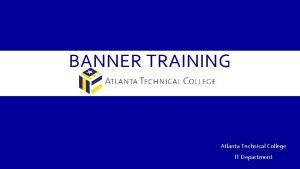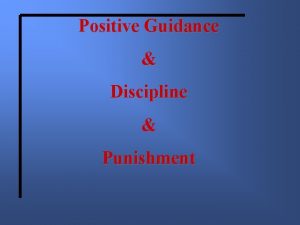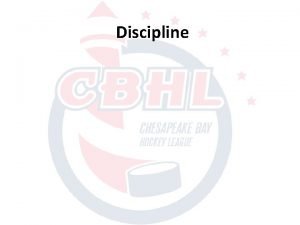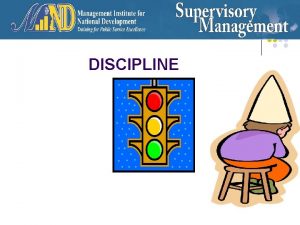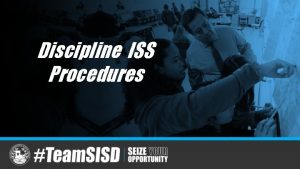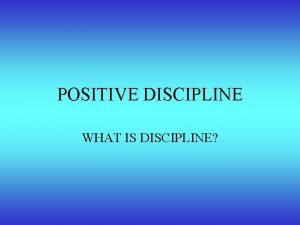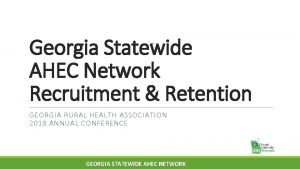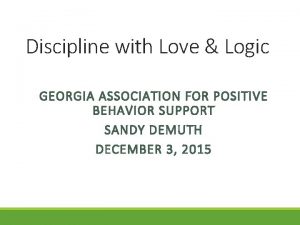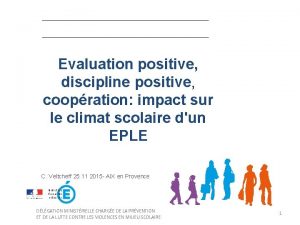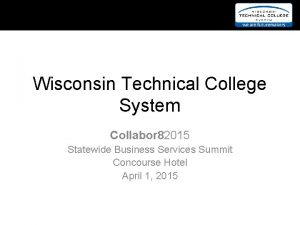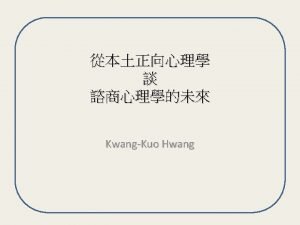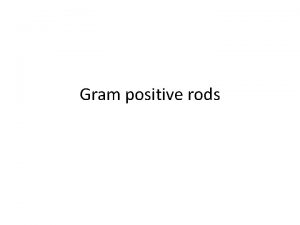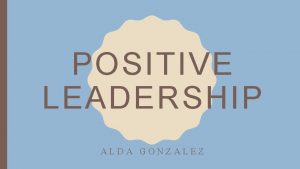Positive Discipline TECHNICAL COLLEGE SYSTEM OF GEORGIA STATEWIDE
























- Slides: 24

Positive Discipline TECHNICAL COLLEGE SYSTEM OF GEORGIA STATEWIDE IMPLEMENTATION TEAM

Agenda �What is Positive Discipline �Why Change? �Traditional Progressive Discipline �Advantages for employees �Comparison of Systems �Future Training and Development

Positive Discipline Grote, Dick. (2006). Discipline without punishment: The proven strategy that turns problem employees into superior performers (2 nd ed. ). New York: American Management Association. It began with a potato chip!

What is Positive Discipline? �Provides for recognition of good performance exhibited by the majority of our employees. �A system that provides a way of solving employee performance and conduct problems by focusing on an adult to adult relationship. �Requires employees to take responsibility for their own behavior.

What is Positive Discipline? �Innovative Process for addressing performance in the work place. �Is not punitive in nature �Encourages communication

Why change? Traditional “Progressive Discipline” system Reflects 1930”s labor vs. management assumptions Goal is COMPLIANCE, not COMMITMENT Did not reinforce a positive change Often results in disharmony and the lack of trust in the workplace

What's wrong with the old system? �All 33 colleges and the central office potentially address discipline issues differently �Minimal level of communication focused on what is being done right �Conflicts with organizational values �Managers solve employee problems instead of employees taking responsibility for problems

What’s the advantage for employees? 1. More frequent recognition of job well done. 2. Confidence that managers/supervisors will confront workers who do not share the same work ethics and commitment. 3. Employees will be treated equitably and fairly in the discipline process.

What’s the advantage for employees? 4. Supportive of a high performance environment. 5. Provides reference guide (matrix) for movement though the process for both managers and employees – no surprises. 6. Managers given discretion to manage and provide feedback to staff.

Comparison of Systems

Informal Discipline Transactions Positive contacts Performance Improvement Discussions (PID)

Formal Discipline Transactions Reminder 1 Reminder 2 Decision Making Leave (DML) Termination

What is a Decision Making Leave? �A Decision Making Leave (DML) is a one-day disciplinary suspension with pay. �It is the final step of the Positive Discipline procedure.

What is a Decision Making Leave? On the “Decision Day” the employee must decide: Either: 1. SOLVE the immediate problem and COMMIT to maintaining a fully acceptable performance in every area of the job or 2. RESIGN, and find more satisfying work elsewhere.

Why Suspend? �Allows a “cooling-off” period. �Communicates the seriousness of the issue. �Demonstrates management resolve �Provides time to think �Previews unemployment �Sends a message to others �Accepted by third parties as “sufficient notice”

Why pay while on suspension? �Changes supervisory role from adversary to coach �Demonstrates organization’s good faith �Eliminates money as an issue �Preserves relationships �Reduces anger, hostility and the potential risk of workplace violence

DML Concerns and Myths �Paid time off while suspended rewards misbehavior �Employees won’t take it seriously – employees will take advantage of DML to get a “free day off” �It’s too gentle/soft/tolerant/permissive

DML Concerns and Myths �It won’t be upheld by third parties �Good employees will resent it �Supervisors won’t be satisfied unless they get their “pound of flesh”

What is the bottom line? The Technical College System of Georgia is not implementing Positive Discipline because there are numerous disciplinary issues prevalent in our technical colleges and central office operations. TCSG feels this approach fits the vision of how an organization that values respect, self-esteem and individual responsibility deals with the inevitable issues of organizational life.

What happens if we don’t change? �Inconsistency in treating performance issues continues throughout Technical College System of Georgia (Several colleges – one agency) �Decisions and appeal processes unknown to employees until day of action �Employees may or may not be asked to help in resolving situations

Implementation Timeline �Implementation targeted for: January 2008 �Additional communication will be provided �Training will be provided to managers in November and December �Awareness sessions planned for employees �Managers will be tasked with communicating the new program to their employees

Implementation Success �Learn about the process �Ask questions �Be optimistic �Communicate the program to your staff

Quote The only person who likes and welcomes change is a wet baby. The rest of us have to adapt and accept the only thing that is constant in life -- change.

Stay Tuned. . . MORE DETAILS COMING SOON…
 Oregon accessibility manual
Oregon accessibility manual Fredric jones positive classroom discipline
Fredric jones positive classroom discipline Positive guidance and discipline
Positive guidance and discipline Sba testing hawaii
Sba testing hawaii Statewide vendor number
Statewide vendor number Statewide health insurance benefits advisors
Statewide health insurance benefits advisors New york statewide senior action council
New york statewide senior action council Statewide community infrastructure program
Statewide community infrastructure program Michigan state industries
Michigan state industries Savns
Savns Statewide construction and development
Statewide construction and development Statewide benefits
Statewide benefits Vinelink texas statewide
Vinelink texas statewide Arizona statewide independent living council
Arizona statewide independent living council Conseil de discipline
Conseil de discipline All staphylococci are catalase positive
All staphylococci are catalase positive Negative number rules
Negative number rules Positive practice positive outcomes
Positive practice positive outcomes Complete college georgia
Complete college georgia Anisa ali
Anisa ali Rajamangala university of technology thanyaburi
Rajamangala university of technology thanyaburi Ho chi minh city technical and economic college
Ho chi minh city technical and economic college Ho chi minh city technical and economic college
Ho chi minh city technical and economic college Atlanta public schools transcript request
Atlanta public schools transcript request Atc banner web
Atc banner web
